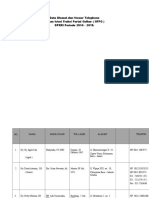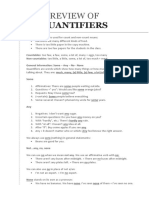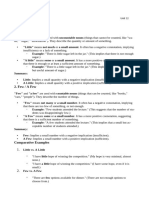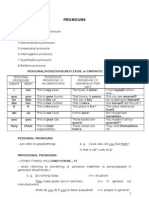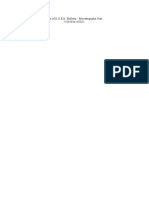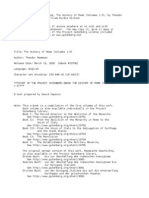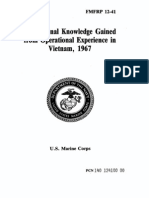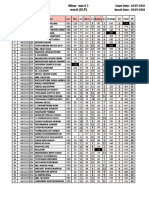0 ratings0% found this document useful (0 votes)
12 viewsQuantifiers
Quantifiers
Uploaded by
Devansh SharmaThis document discusses quantifiers, which are words used to indicate quantity without stating an exact number. There are three main types of quantifiers: those used with countable nouns, uncountable nouns, and those that can be used with either. Examples are given for quantifiers like many, few, a few, much, little, a little, enough, plenty, lots of, some, any. The usage of some and any is explained in more detail.
Copyright:
© All Rights Reserved
Available Formats
Download as PPT, PDF, TXT or read online from Scribd
Quantifiers
Quantifiers
Uploaded by
Devansh Sharma0 ratings0% found this document useful (0 votes)
12 views22 pagesThis document discusses quantifiers, which are words used to indicate quantity without stating an exact number. There are three main types of quantifiers: those used with countable nouns, uncountable nouns, and those that can be used with either. Examples are given for quantifiers like many, few, a few, much, little, a little, enough, plenty, lots of, some, any. The usage of some and any is explained in more detail.
Original Title
Untitled
Copyright
© © All Rights Reserved
Available Formats
PPT, PDF, TXT or read online from Scribd
Share this document
Did you find this document useful?
Is this content inappropriate?
This document discusses quantifiers, which are words used to indicate quantity without stating an exact number. There are three main types of quantifiers: those used with countable nouns, uncountable nouns, and those that can be used with either. Examples are given for quantifiers like many, few, a few, much, little, a little, enough, plenty, lots of, some, any. The usage of some and any is explained in more detail.
Copyright:
© All Rights Reserved
Available Formats
Download as PPT, PDF, TXT or read online from Scribd
Download as ppt, pdf, or txt
0 ratings0% found this document useful (0 votes)
12 views22 pagesQuantifiers
Quantifiers
Uploaded by
Devansh SharmaThis document discusses quantifiers, which are words used to indicate quantity without stating an exact number. There are three main types of quantifiers: those used with countable nouns, uncountable nouns, and those that can be used with either. Examples are given for quantifiers like many, few, a few, much, little, a little, enough, plenty, lots of, some, any. The usage of some and any is explained in more detail.
Copyright:
© All Rights Reserved
Available Formats
Download as PPT, PDF, TXT or read online from Scribd
Download as ppt, pdf, or txt
You are on page 1of 22
QUANTIFIERS
Quantifiers are words that
are used to state quantity or
amount of something
without stating the exact
number.
Quantifiers answer the questions
"How many?" and "How
much?"
We use quantifiers with
plural countable nouns and
uncountable nouns.
Quantifiers must agree with the noun.
There are 3 main types of quantifiers.
Quantifiers that are used with countable
nouns, quantifiers that are used with
uncountable nouns. and the 3rd type are
quantifiers that are used with either
countable nouns or uncountable nouns.
Countable Nouns
many I don't have many
apples.
few* We know few
people in the area.
I would like to get to know
more.
a few** We know a few people in
the area. I know enough
people to keep me happy.
Uncountable Nouns
Much I don't have much
money.
little* I know little English.
I am going to have a
problem getting around
England.
a little** I know a little English, at
least enough to get to
England.
*few/little - means that is not
enough of something.
** a few /a little - means that
there are not a lot of something,
but there is enough.
Few and little describe the quantity
in a negative way:
Few people visited him in hospital
(= he had almost no visitors)
He had little money (= almost no
money)
A few (for countable nouns) and a little
(for uncountable nouns) describe the
quantity in a positive way:
"I've got a few friends" (= maybe not
many, but enough)
"I've got a little money" (= I've got enough
to live on)
With Countable and Uncountable
Nouns
Enough I have enough money.
We have enough cookies.
Plenty I have plenty of money.
We have plenty of cookies
A lot of I have a lot of money.
We have a lot of cookies.
Lots of I have lots of money.
We have lots of cookies.
Some I have some money.
We have some cookies.
Any I don’t have any money.
Enough is placed before the noun, to indicate
the quantity required or necessary:
“There is enough bread for lunch.”
“We didn't have enough time to visit London
Bridge.”
“Is there enough milk for breakfast?”
“She has enough talent to become an
international singing star.”
Some and any
When to use some and any?
Some and any are used to state the
quantity, amount of something.
When using some or any the
exact number is not stated.
Some and any can be used when:
The exact number is not known.
The exact number is not important or
relevant.
Some and any are used with countable
nouns and uncountable nouns
Any
Any is used with:
Negative sentences
When asking a question.
Any is used when a sentence is grammatically positive,
but the meaning of the sentence is negative.
Do you have any ice cream left?
I don't have any money today. I am getting paid on
Friday.
My brother never does any thing good.
Some
Some is used with:
Positive sentences. When asking a question, if
the answer is expected to be positive or not
relevant or you are offering something.
The children have some free time.
Please buy some bananas.
Can I have a glass of tea?
Would you like some cake?
Compound nouns with some- and
any- are used in the same way as
some and any.
Positive statements:
“Someone is sleeping in my bed.”
“He saw something in the garden.”
“I left my glasses somewhere in the house.”
Questions:
“Are you looking for someone?” (= I'm sure
you are)
“Have you lost something?” (= I'm sure you
have)
“Is there anything to eat?” (a real question)
“Did you go anywhere last night?”
Negative statements:
“She didn't go anywhere last night.”
“He doesn't know anybody here.”
There is a difference in emphasis
between nothing, nobody etc. and
not ... anything, not ... anybody:
“I don't know anything about it.” (=
neutral, no emphasis)
“I know nothing about it.” (= more
emphatic, maybe defensive)
“ Is there anybody who speaks English
here?”
“There is nobody in the house at the
moment.”
“Does anybody have the time?”
“When I arrived there was nobody to
meet me.”
ANY can also be used in positive
statements to mean 'no matter
which', 'no matter who', 'no matter
what':
“You can borrow any of my books.”
“They can choose anything from the menu.”
“You may invite anybody to dinner, I don't mind
who comes.”
You might also like
- Mustard & Roddy Ricch-BallinDocument1 pageMustard & Roddy Ricch-BallinAmiyah100% (1)
- Data Alamat Dan Nomor Telephone IIFPG 1419 Up DatedDocument28 pagesData Alamat Dan Nomor Telephone IIFPG 1419 Up DatedRahmat Nofiardi90% (10)
- QuantifiersDocument29 pagesQuantifiersTeofilo Alvarez100% (2)
- QUANTIFIERSDocument12 pagesQUANTIFIERSGRECIA SAMANTHA ROSALES HERNANDEZ100% (1)
- Nouns and QuantifiersDocument4 pagesNouns and Quantifiersvvhiip0% (1)
- Reviewof QuantifiersDocument4 pagesReviewof QuantifiersAni CruzNo ratings yet
- Determiners NoteDocument7 pagesDeterminers NoteKrish KaushNo ratings yet
- QUANTIFIERSDocument11 pagesQUANTIFIERSAna JuliaNo ratings yet
- Determiners and Quantifiers Part 1Document54 pagesDeterminers and Quantifiers Part 1Andrés MosqueraNo ratings yet
- Unit 12 Updtd To Dec 19.49.02Document5 pagesUnit 12 Updtd To Dec 19.49.02polyglotcmNo ratings yet
- Topic: Quantifiers: With Count Nouns Only With Uncount Nouns Only With Both Count and Uncount NounsDocument7 pagesTopic: Quantifiers: With Count Nouns Only With Uncount Nouns Only With Both Count and Uncount NounsbrifaniobumbaNo ratings yet
- Countable and Uncountable NounsDocument18 pagesCountable and Uncountable NounsMX CreationNo ratings yet
- 7 Quantifiers SlidesDocument55 pages7 Quantifiers Slidesdaday4671No ratings yet
- Countable and Uncountable Nouns QuantifiersDocument24 pagesCountable and Uncountable Nouns Quantifiersjohan sebastian montes rodriguezNo ratings yet
- QUANTIFIERS Complement Insight Pre Inter Page 33Document7 pagesQUANTIFIERS Complement Insight Pre Inter Page 33Ana Luiza BaptistaNo ratings yet
- 6 SessionDocument27 pages6 SessionJuan Gonzales Villacorta100% (1)
- Grammar Countable Uncountable Indefinite PronounsDocument6 pagesGrammar Countable Uncountable Indefinite PronounsLuciano Fernández de SNo ratings yet
- English Grammar Quantifiers Some AnyDocument7 pagesEnglish Grammar Quantifiers Some AnybiffinNo ratings yet
- 2° - Unit 2 Quantifiers.Document10 pages2° - Unit 2 Quantifiers.Ile CapeNo ratings yet
- Topic: Quantifiers: With Count Nouns Only With Uncount Nouns Only With Both Count and Uncount NounsDocument4 pagesTopic: Quantifiers: With Count Nouns Only With Uncount Nouns Only With Both Count and Uncount NounsbrifaniobumbaNo ratings yet
- DeterminersDocument5 pagesDeterminersGennylyn Del CastilloNo ratings yet
- The QUANTIFIERS (Countable and Uncountable Noun)Document15 pagesThe QUANTIFIERS (Countable and Uncountable Noun)Pich KeopisethNo ratings yet
- Any As A Determiner: Weak Form Any: Indefinite QuantitiesDocument14 pagesAny As A Determiner: Weak Form Any: Indefinite QuantitiesGabriel FrascoNo ratings yet
- A1233294090 23878 16 2018 DeterminersquantifiersDocument16 pagesA1233294090 23878 16 2018 DeterminersquantifiersDeekshith RajNo ratings yet
- Módulo 05 - Aula 12 - QuantificadoresDocument11 pagesMódulo 05 - Aula 12 - Quantificadorestugga.fcostaNo ratings yet
- Quantifiers 1 - 1Document2 pagesQuantifiers 1 - 1Natalia NatividadNo ratings yet
- Some, Few, A Few, Little, A LittleDocument9 pagesSome, Few, A Few, Little, A LittleAlina DanNo ratings yet
- (Uncountable Noun) (Countable Noun)Document5 pages(Uncountable Noun) (Countable Noun)Mirela GNo ratings yet
- Count and NonCount NounsDocument19 pagesCount and NonCount NounsBerna GüzelderenNo ratings yet
- MuchDocument17 pagesMuchdaniloNo ratings yet
- Ingles CuantifiersDocument2 pagesIngles CuantifiersSAUCRNo ratings yet
- Explicacion Articulos The A An Some Many Much A Lot Of...Document3 pagesExplicacion Articulos The A An Some Many Much A Lot Of...arojasvaldez21No ratings yet
- Trabajo Final - Much, Many, Some, AnyDocument6 pagesTrabajo Final - Much, Many, Some, AnySaulo Ronal HCNo ratings yet
- PronounsDocument7 pagesPronounsMarta JurasNo ratings yet
- Handout 12.2 - QuantifiersDocument6 pagesHandout 12.2 - QuantifiersEda Nur ÖzaltınNo ratings yet
- English Life N1 M8Document7 pagesEnglish Life N1 M8Ed SoNo ratings yet
- Topic: Quantifiers: Intermediete BookletDocument14 pagesTopic: Quantifiers: Intermediete BookletbrifaniobumbaNo ratings yet
- Couuntable and Ancountable NounsDocument4 pagesCouuntable and Ancountable Nounsyas.80.salemNo ratings yet
- QuantifiersDocument36 pagesQuantifiersHerFely50% (2)
- CD DeterminersDocument1 pageCD Determinersdang dinhNo ratings yet
- Partitive Pronouns CCCDocument5 pagesPartitive Pronouns CCCemilse RodríguezNo ratings yet
- Countable and Uncountable NounsDocument7 pagesCountable and Uncountable NounsValentine NNo ratings yet
- Determiners Determiners Determiners Determiners: Class 11, GrammarDocument6 pagesDeterminers Determiners Determiners Determiners: Class 11, GrammarRehanNo ratings yet
- Much and ManyDocument10 pagesMuch and ManyBerylMasdiaryNo ratings yet
- 08.5 Quantifiers With Countable and Uncountable NounsDocument6 pages08.5 Quantifiers With Countable and Uncountable NounsMyller Oliveros GarciaNo ratings yet
- Módulo 3 Grammar and BusinessMomentDocument12 pagesMódulo 3 Grammar and BusinessMomentEstevãoEduardoCherengaNo ratings yet
- Grammar Countable An Uncountable NounsDocument7 pagesGrammar Countable An Uncountable NounsEstefania Osorio RiañoNo ratings yet
- Use of Some and Any: Study The Following TablesDocument7 pagesUse of Some and Any: Study The Following Tablesakhilesh sahooNo ratings yet
- Modal Use: Conditional Is Often Used in Situations Where A Conditional Sense Is Understood ButDocument4 pagesModal Use: Conditional Is Often Used in Situations Where A Conditional Sense Is Understood ButtincetoNo ratings yet
- Determ Iners A ND Quant Ifiers: Gcss 2 020Document17 pagesDeterm Iners A ND Quant Ifiers: Gcss 2 020Adriana Sanchez Fuentes100% (1)
- Something and AnythingDocument6 pagesSomething and Anythinginti gonzales salvatierraNo ratings yet
- Learning Activity 4Document8 pagesLearning Activity 4FatrisNo ratings yet
- Common Erros NotesDocument16 pagesCommon Erros Notesweicheng930616No ratings yet
- Determiner " ": by MeDocument6 pagesDeterminer " ": by MeTommy Pranata PanjaitanNo ratings yet
- Indefinite PronounsDocument9 pagesIndefinite PronounsCristina Maria NistorNo ratings yet
- QuantifiersDocument16 pagesQuantifiersEnrique RomeroNo ratings yet
- Quantifiers 1Document5 pagesQuantifiers 1Ana María CarriónNo ratings yet
- Acing 3 Bloque 09 Tema 6 ImprimibleDocument26 pagesAcing 3 Bloque 09 Tema 6 ImprimibleMiriam GalanNo ratings yet
- Determiners: Cambridge Advanced Learner's Dictionary, 3rd EditionDocument1 pageDeterminers: Cambridge Advanced Learner's Dictionary, 3rd Editionoprea silvia elenaNo ratings yet
- Daily Spanish Lessons: The New And Proven Concept To Speak Spanish In 45 DaysFrom EverandDaily Spanish Lessons: The New And Proven Concept To Speak Spanish In 45 DaysNo ratings yet
- We Are Neighbors! Being a Part of Community - Social Skills Book Kindergarten | Children's Friendship & Social Skills BooksFrom EverandWe Are Neighbors! Being a Part of Community - Social Skills Book Kindergarten | Children's Friendship & Social Skills BooksNo ratings yet
- Functional Dependency & NormalizationDocument92 pagesFunctional Dependency & NormalizationDevansh SharmaNo ratings yet
- Subqueries BaljinderDocument32 pagesSubqueries BaljinderDevansh SharmaNo ratings yet
- User Interface Design MCQ With AnswerDocument2 pagesUser Interface Design MCQ With AnswerDevansh SharmaNo ratings yet
- Use Case Modal DevelopmentDocument3 pagesUse Case Modal DevelopmentDevansh SharmaNo ratings yet
- List of K.S.E.B. Bulletin - Muvattupuzha Unit 5/2010 To 4/2011Document11 pagesList of K.S.E.B. Bulletin - Muvattupuzha Unit 5/2010 To 4/2011SreedharanPNNo ratings yet
- Examen Ingles Selectividad 2013Document3 pagesExamen Ingles Selectividad 2013Aula10 Selectividad onlineNo ratings yet
- Furatena, Queen of The Country of The Muzos:: Juan José Cancelado B. 11-01. Academic GroupDocument5 pagesFuratena, Queen of The Country of The Muzos:: Juan José Cancelado B. 11-01. Academic GroupJuanNo ratings yet
- The History of Rome (Volumes 1-5) by Mommsen, Theodor, 1817-1903Document1,562 pagesThe History of Rome (Volumes 1-5) by Mommsen, Theodor, 1817-1903Gutenberg.org100% (3)
- Dirlist1 00000000 00120000 PDFDocument86 pagesDirlist1 00000000 00120000 PDFDeepak SureshNo ratings yet
- Skill Test 6bDocument5 pagesSkill Test 6bSebastian KORCZAKNo ratings yet
- US Cities DatabaseDocument1,260 pagesUS Cities DatabaseFxxukup SRNo ratings yet
- 20241101032948Document1 page20241101032948Manisha RajputNo ratings yet
- Thai Fluency 1 - Glossika Mass Sentences (1 - 10)Document374 pagesThai Fluency 1 - Glossika Mass Sentences (1 - 10)PCiao100% (1)
- A List For The Curious MuslimDocument15 pagesA List For The Curious MuslimAdnan100% (1)
- MB UmulDocument15 pagesMB Umullusiana dwiNo ratings yet
- List of Engr Officers - 30jun63 CommisionDocument16 pagesList of Engr Officers - 30jun63 CommisionPatrick AdamsNo ratings yet
- EA 41 A Letter From Suppiluliuma, King of Hatti, To Akhenaten, King of EgyptDocument6 pagesEA 41 A Letter From Suppiluliuma, King of Hatti, To Akhenaten, King of EgyptPersefoniaNo ratings yet
- Daftar OST Detective ConanDocument2 pagesDaftar OST Detective ConanRahmat_29100% (1)
- Trading in Slaves in BelaDocument16 pagesTrading in Slaves in BelaJUAN FRANCISCO MARTINEZ ALCAZARNo ratings yet
- Duos para Principiantes de Antonio de Cabezon VolDocument6 pagesDuos para Principiantes de Antonio de Cabezon VolO CONXURO DA QUEIMADA ODMNo ratings yet
- 20200116-Fail Senarai Murid Rumah Sukan 2020Document19 pages20200116-Fail Senarai Murid Rumah Sukan 2020Mohd Fadzil Mohd ArifNo ratings yet
- FMFRP 12-41 Professional Knowledge Gained From Operational Experience in Vietnam, 1967Document510 pagesFMFRP 12-41 Professional Knowledge Gained From Operational Experience in Vietnam, 1967Jared A. Lang100% (3)
- Selection ListDocument1 pageSelection ListRachit DehariyaNo ratings yet
- ENCUADREDocument14 pagesENCUADRERosmark MIRIAMNo ratings yet
- Group 4: Kalinga TribeDocument10 pagesGroup 4: Kalinga TribeMaritess MaglaquiNo ratings yet
- Land and People of UttarakhandDocument32 pagesLand and People of Uttarakhanddarsh maiwala100% (1)
- Aushadh Darshan by Swami Ramdev Ji Maharaj Edited by Acharya Bala Krishna Ji 2005 Hardwar - Divya PrakashanDocument124 pagesAushadh Darshan by Swami Ramdev Ji Maharaj Edited by Acharya Bala Krishna Ji 2005 Hardwar - Divya Prakashanjesaloj519No ratings yet
- Roma Pass - Museums / Sites of Interest Single Ticket / Combined Ticket Full Rate 2015 Reduced Rate 2015Document1 pageRoma Pass - Museums / Sites of Interest Single Ticket / Combined Ticket Full Rate 2015 Reduced Rate 2015MirelaStefanNo ratings yet
- Jose Rizal:: Life, Works, and WritingsDocument16 pagesJose Rizal:: Life, Works, and WritingsMhiahLine TolentinoNo ratings yet
- Pakistan Shipping Agent DetailsDocument7 pagesPakistan Shipping Agent DetailsRamiahNagarajanNo ratings yet
- Minor 3Document5 pagesMinor 3subhanbrothers07No ratings yet
- ShamanDocument67 pagesShamanKuzairi TokMahraja100% (5)

